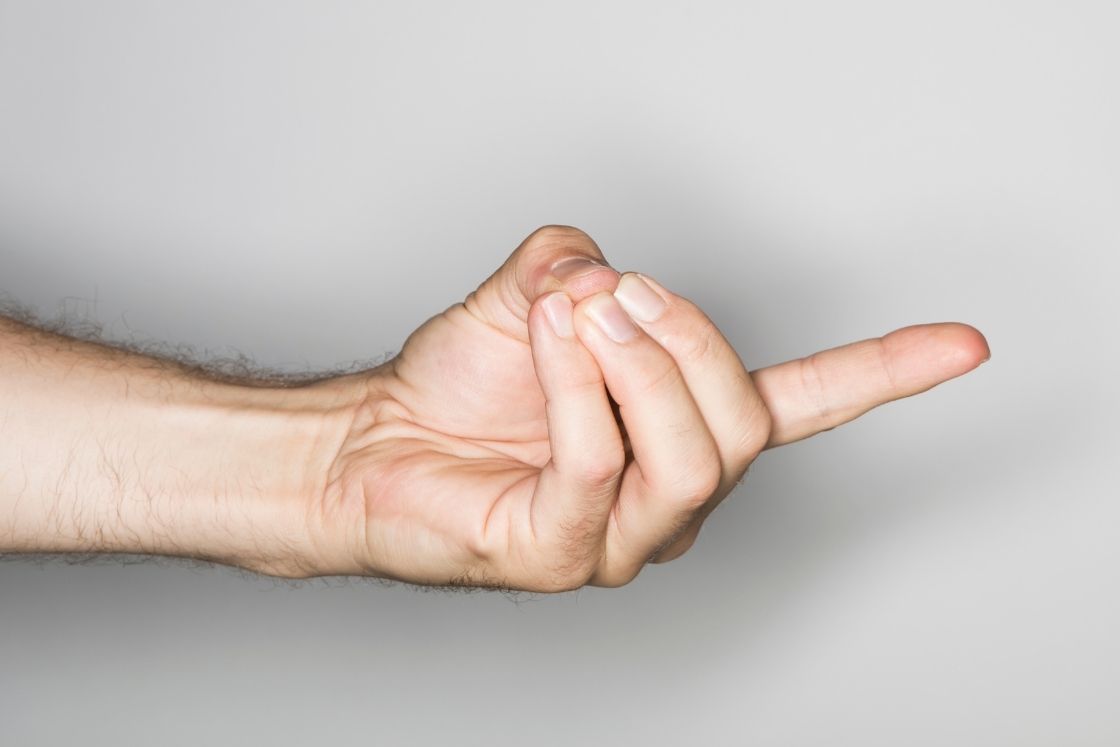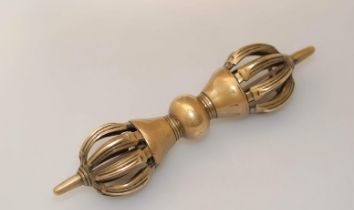Vajra Mudra (Gesture of Fiery Thunderbolt): Meaning, How to Do & Benefits
Vajra Mudra is a simple but powerful yoga gesture that feels like a fiery thunderbolt. In Sanskrit, “Vajra” means both “diamond” and “thunderbolt,” representing unbreakable strength and powerful force. Practicing Vajra Mudra can help boost your energy, reduce laziness,...

 Image Source: Canva
Image Source: CanvaVajra Mudra is a simple but powerful yoga gesture that feels like a fiery thunderbolt. In Sanskrit, “Vajra” means both “diamond” and “thunderbolt,” representing unbreakable strength and powerful force. Practicing Vajra Mudra can help boost your energy, reduce laziness, and fill your body with vital energy.
Doing Vajra Mudra every day can make you feel more energetic and focused. It refreshes your body, helps you overcome feelings of being stuck, and keeps your energy flowing. It’s a great way to improve both your physical and mental health.
Meaning and symbolism
 A Tibetan vajra. Image Source: Canva
A Tibetan vajra. Image Source: CanvaVajra Mudra involves extending the index finger while pressing the other three fingertips against the thumb. The extended index finger represents the fiery thunderbolt weapon or Vajra, symbolising the transformation of ignorance into wisdom. Because of this, Vajra Mudra is also known as Bodhiyangi Mudra.
The term “Vajra” signifies ‘firmness of spirituality,’ making this mudra a symbol of supreme knowledge.
Apart from yoga, Vajra Mudra appears in rituals and symbols across various religions, always maintaining its core hand gesture.
Vajra Mudra in hinduism
In Hinduism, Vajra Mudra is linked to the Vajra, a powerful weapon used by Indra, the god of thunder and storms. The Vajra is known for being as strong as a diamond and as forceful as a thunderbolt. Doing Vajra Mudra helps you reflect these qualities by helping to clear away negative traits and ignorance. It is believed to connect you with the powerful energy of Indra, making you stronger and more spiritually resilient.
Vajra mudra in buddhism
In Vajrayana Buddhism, Vajra Mudra represents the balance between male and female qualities, showing harmony and unity. In this gesture, the extended index finger stands for wisdom, while the other fingers pressing against the thumb symbolize enlightenment and compassion.
Practicing Vajra Mudra helps bring spiritual power and change, guiding people to reach a higher level of understanding and insight. This mudra is a tool for personal growth and spiritual enlightenment, fitting with the Buddhist goal of wisdom and unity.
How to do vajra mudra (steps)

Note: After 3 minutes, slowly release the tongue lock first and then gently unfold your fingers one by one. Rest your hands, extend all fingers straight, and keep your palms facing up on your lap.
How does It work?
In Vajra Mudra, the index finger, which represents the Air element in the body, is exposed to the natural energy of the environment. This exposure enhances the fire energy within the body. The fire energy acts like a thunderbolt, making you feel more active and energetic.
Additionally, Vajra Mudra addresses weaknesses related to the Earth element. When the Air element interacts with the weakened Earth element through this mudra, it helps remove toxins from the body. The Air element also supports the functioning of the Vajra Nadi and improves the circulatory system.
The vajra nadi
Vajra Mudra also aids in detoxifying the subtle energy channels, known as Nadis, in the body.
When performed consistently, this mudra helps clear blockages in the Vajra Nadi, which is linked to urogenital disorders. Since the Vajra Nadi is located inside the Sushumna Nadi, this mudra facilitates an unobstructed flow of Prana (life force) through the Chakras and supports Kundalini awakening.
Precautions
Avoid practicing Vajra Mudra if you are feeling unwell or under significant stress. Apply gentle pressure with your fingers to avoid strain. Breathe calmly and gently throughout the practice. Ensure a comfortable and well-aligned posture to prevent strain. Limit practice to avoid discomfort or fatigue. Use a cushion or chair if sitting on the floor is uncomfortable.Contradictions
Avoid practicing if you have high blood pressure; limit sessions to 2-3 minutes, up to 10 minutes daily. Do not practice if you have injuries or conditions affecting your hands or wrists without medical advice. Skip practice if you are feeling unwell or experiencing significant stress. Stop immediately if you experience dizziness or discomfort.Vajra mudra benefits
Vajra Mudra is a powerful hand gesture with many benefits. It helps improve blood flow and reduces stiffness from sitting too long. This mudra also supports the body’s natural process of getting rid of toxins. It strengthens the digestive system, boosts energy, and increases motivation. Plus, it helps the heart work better and can reduce cravings for things like tobacco or caffeine.
Boosts Circulation: Vajra Mudra enhances blood flow, which can be particularly beneficial for those with low blood pressure by improving overall energy levels and vitality. Reduces Stiffness: By relieving tiredness and stiffness from long periods of sitting, Vajra Mudra can improve flexibility and comfort, making it easier to stay active throughout the day. Enhances Detoxification: The mudra aids in detoxifying the body by boosting toxin elimination and purifying the lungs and Nadis, which supports better overall health and well-being. Improves Digestive Health: Strengthening the stomach, spleen, and pancreas, Vajra Mudra helps address digestive issues and promotes a more balanced and efficient digestive system. Boosts Motivation: It combats lethargy and lack of interest, providing a revitalizing boost of enthusiasm and motivation to tackle tasks and challenges. Supports Heart Health: By strengthening the heart and improving its function, Vajra Mudra contributes to better blood circulation and overall cardiovascular health. Reduces Stimulant Dependence: Practicing Vajra Mudra can help decrease cravings for stimulants like tobacco, tea, and coffee, leading to healthier lifestyle choices.Conclusion
In summary, Vajra Mudra is an easy yet powerful hand gesture that helps with both physical and mental health. It improves blood flow, reduces stiffness, and helps remove toxins from the body. This mudra strengthens your digestive organs and gives you more energy and motivation. It also supports heart health and can help you cut down on things like tobacco and caffeine. Doing Vajra Mudra regularly can make you feel more alive, clear-headed, and balanced.

 Lynk
Lynk 
































![Is Your SEO Strategy Built for the AI Era? [Webinar] via @sejournal, @hethr_campbell](https://www.searchenginejournal.com/wp-content/uploads/2025/07/6b-240.png)